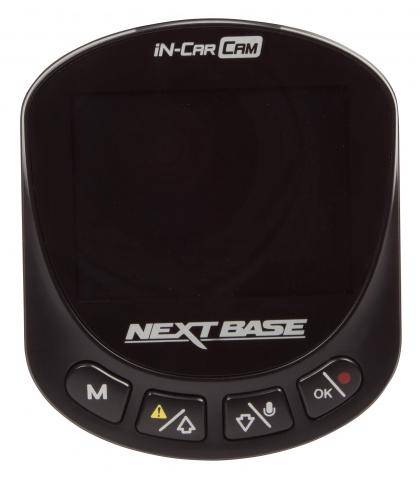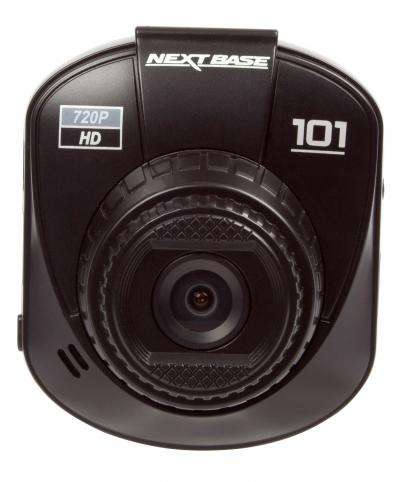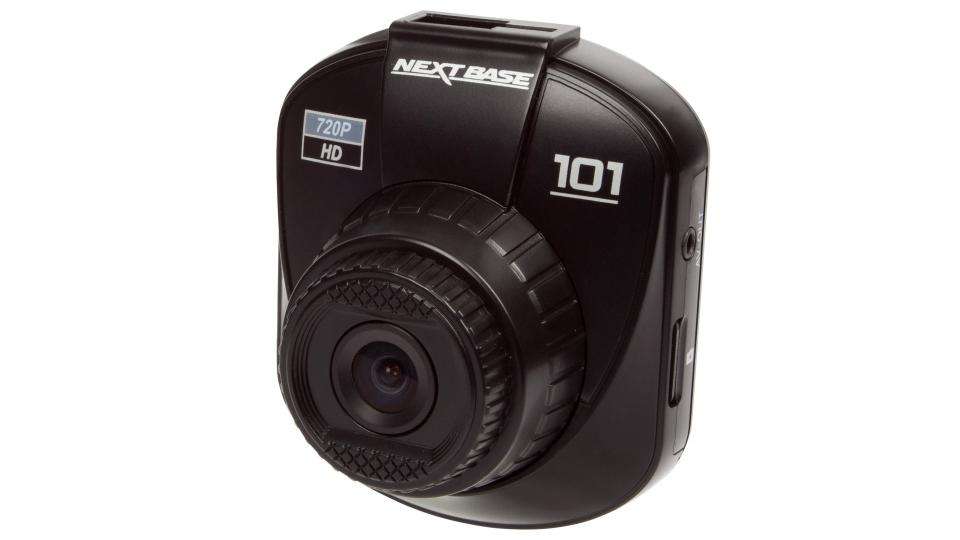The Nextbase 101 Go is the cheapest dashcam we've tested, and also one of the smallest. The dinky little unit and its equally compact suction cup holder will do little to obstruct your view, even if you ignore the safety advice to place the device behind your rear view mirror. It’s the lightest camera we've seen, too, weighing only 56g, so there’s little prospect of it yanking the suction cup off the windscreen when you go over a speed bump.
The camera could hardly be simpler to operate. It starts recording the moment you plug in the charger and it's easy to navigate the menus with the four substantial buttons on the front of the device. The 101 Go has a “G Sensor” that claims to detect impacts automatically and to protect recordings made around that incident from being overwritten, but you can press the incident button on the front of the device just to make sure your vital footage is kept.
Daytime footage
The tiny screen on the 101 Go isn’t particularly bright. It’s fine for browsing the menus, but if you’re trying to replay an incident, you won’t be able to see a huge amount in broad daylight. The limited resolution of the screen also doesn’t give you much, if any, hope of picking out details such as vehicle number plates. The camera will turn off its screen after a few seconds, so you don't have to worry about being distracted.

There’s no software supplied with the 101 Go, but plug the device into a PC with the supplied USB cable and select Mass Storage mode, and it’s easy to browse the videos and photos stored on the camera. Protected recordings (those that have made during an incident) have the letters “PRO” at the beginning of their filename, making it easy to find critical footage.
The camera has weak video quality. This is one of only two dashcams we've tested with video resolution limited to 720p at 30fps, and the captured footage is blocky, looks heavily compressed and lacks detail. Even when crawling past parked cars at around 5 to 10mph, it’s impossible to pick out number plates in broad daylight, and at 120 degrees, the camera's field of view is one of the narrowest we've seen.
Night-time footage
Things get worse at night. On unlit roads, it can be tricky to make out what’s going on and there’s lots of distortion on the recorded video – it reminds us of viewing old VHS security camera footage. The footage would probably be just about good enough to give you and your insurance company a view of an accident, but you wouldn’t want to rely on it if you needed to get the number plate of someone who failed to stop after an accident, for example.

Photo quality isn’t too shabby. If you had to take quick snaps of your car after a daytime accident, the 101 Go would suffice. Detail is reasonable, although the shots we took on a cloudy afternoon veered towards over-exposure, so the camera might struggle in really bright conditions.
Overall, the 101 Go just about covers the basics. If you want a safety net to prove that you didn’t cause an accident, this dashcam should just about suffice. However, there’s no GPS for location or speed data and no PC software, and the video quality is basic. This camera is inexpensive, but is the bare minimum in terms of both features and price - we'd rather find the extra £30 for the Mio MiVue 518 .
|
HARDWARE |
|
|
Max video resolution |
720p |
|
Max fps (at max resolution) |
30 |
|
Field of view (degrees) |
120 |
|
Max photo resolution |
4,032x3,024 |
|
Memory card format |
microSD |
|
Supplied memory card |
None |
|
Screen size |
2in |
|
Screen resolution |
320x240 |
|
GPS |
Yes |
|
Speed camera alerts |
No |
|
Crash sensors |
Yes |
|
Battery capacity |
140mAh |
|
Stated battery life |
15 mins |
|
Dimensions (WxDxH) |
68x37x58mm |
|
Weight |
56g |
|
Connections |
Mini USB, 2.5mm AV out |
|
ACCESSORIES |
|
|
Supplied mounts |
Suction cup |
|
Also in box |
Cigarette lighter charger, USB cable |
|
Supplied software |
None |

